Key takeaways:
- Reputational risks are closely linked to consumer sentiment and can significantly impact customer loyalty and trust.
- Effective management strategies include proactive communication, crisis response planning, and fostering engagement with stakeholders.
- Tools such as social media monitoring, stakeholder surveys, and sentiment analysis are essential for assessing and addressing reputational risks.
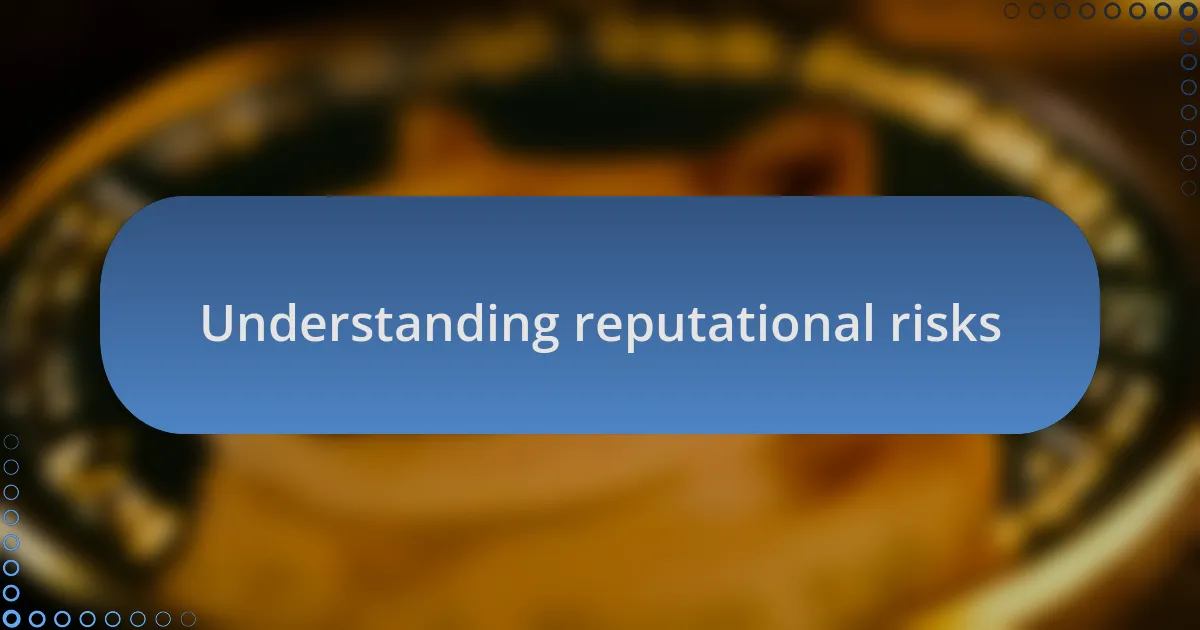
Understanding reputational risks
Reputational risks are often insidious, creeping up on businesses when they least expect it. I remember a time when a colleague’s minor misstep in communication led to a public backlash that tarnished not just their image but that of our entire team. It’s fascinating how quickly perception can shift; one misinterpreted statement can spiral out of control, influencing stakeholder trust.
When we look closely at reputational risks, it becomes clear that they are intricately tied to consumer sentiment. Consider, for a moment, how you’ve reacted to a brand’s response in a crisis. Didn’t you feel more connected to the companies that handled their challenges transparently? This emotional connection highlights the significance of reputation; it can dictate customer loyalty or drive potential clients away, often without warning.
In the crypto space, where volatility reigns, a damaged reputation can be particularly catastrophic. I often ponder the numerous projects that have fallen from grace due to mismanaged communications or scams. How much does a brand’s integrity matter to you when choosing to invest? It’s critical to recognize that protecting reputation isn’t just about managing risks—it’s about fostering trust and resilience within the community.
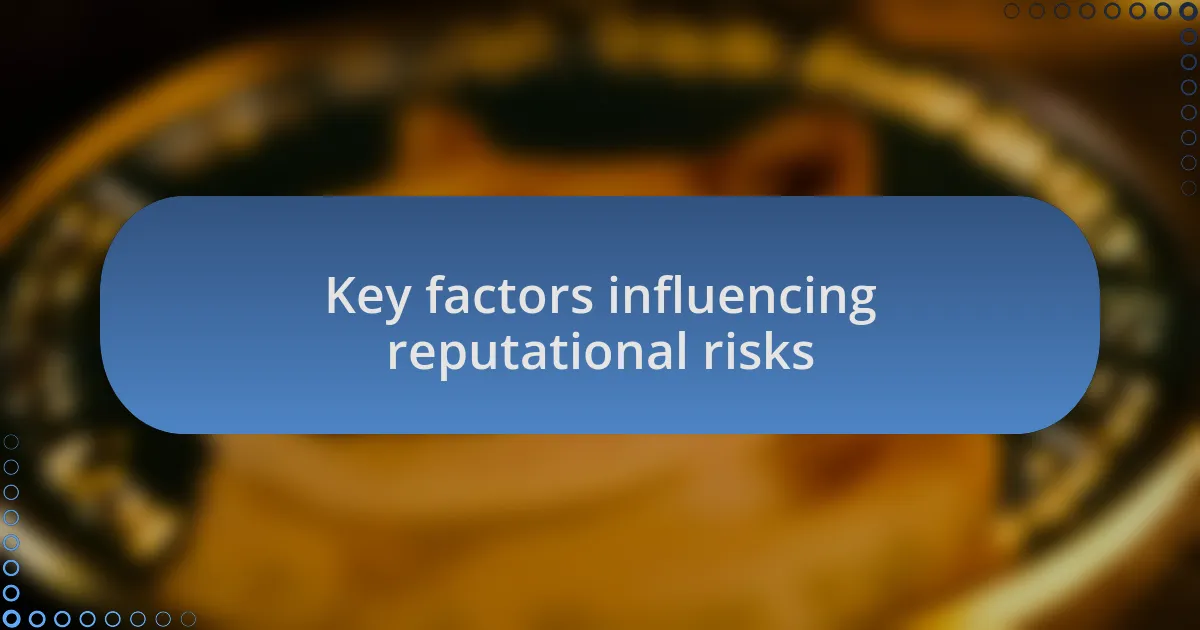
Key factors influencing reputational risks
The transparency of communication stands as one of the pivotal factors influencing reputational risks. When a company fails to disclose important information—or, worse, misleads its audience—trust erodes rapidly. I recall a launch of a crypto project that promised innovative technology but fell short on transparency. The subsequent frustration from the community was palpable; it spread like wildfire on social media, permanently damaging the project’s image.
Consumer behavior also plays a significant role in shaping reputational risks. The perception of a brand can change overnight based on public sentiment or external events. I’ve witnessed how quickly sentiments can shift during a market downturn; investors often look for someone to blame, and if a brand is perceived as untrustworthy, it becomes an easy target. Do you find yourself second-guessing your choices in such turbulent times? It’s intriguing how emotional reactions can dictate the course of a brand’s reputation.
Additionally, the competitive landscape in the crypto market exacerbates reputational vulnerabilities. With countless alternatives available, a single misstep can lead customers to flock to competitors. I often think of a promising project that lost traction because another company capitalized on their blunders. In today’s fast-paced environment, managing reputational risks requires vigilance, adaptability, and a genuine commitment to customer engagement. Otherwise, you risk being forgotten amid a sea of options.
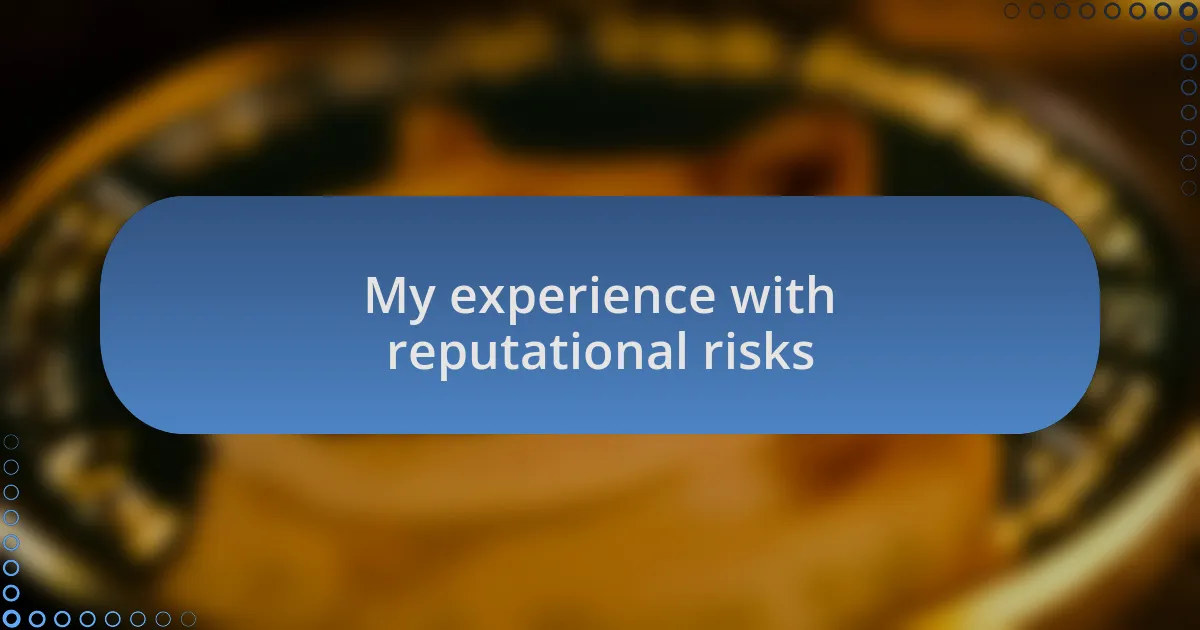
My experience with reputational risks
In my journey through the crypto landscape, I’ve experienced firsthand the fallout from reputational risks. There was a time when I closely followed a project that promised groundbreaking solutions but ended up embroiled in allegations of fraud. I remember how I felt—a mix of disbelief and disappointment—as I watched the enthusiasm for the project plummet. It struck me just how fragile a reputation can be, dangling on the edge of rumors and miscommunication.
Another instance that sticks with me is when I engaged with a brand that seemed transparent but later revealed hidden fees and policies that weren’t well communicated. The sudden realization felt like betrayal, and it made me question my investment choices. Have you ever been in a similar situation? It’s unsettling how swiftly trust can diminish, and it serves as a powerful reminder of the importance of clear, honest communication.
I’ve also learned that reputation is a living thing, often evolving based on the actions—big or small—of a company. One particular startup I championed initially projected a positive image, only to falter due to a poorly handled customer complaint online. As I watched their reputation erode, I reflected on the essential nature of customer feedback and responsiveness. How proactive are we in addressing concerns? It’s a profound question that, I’ve come to realize, shapes not just public perception but the very essence of a brand’s longevity.
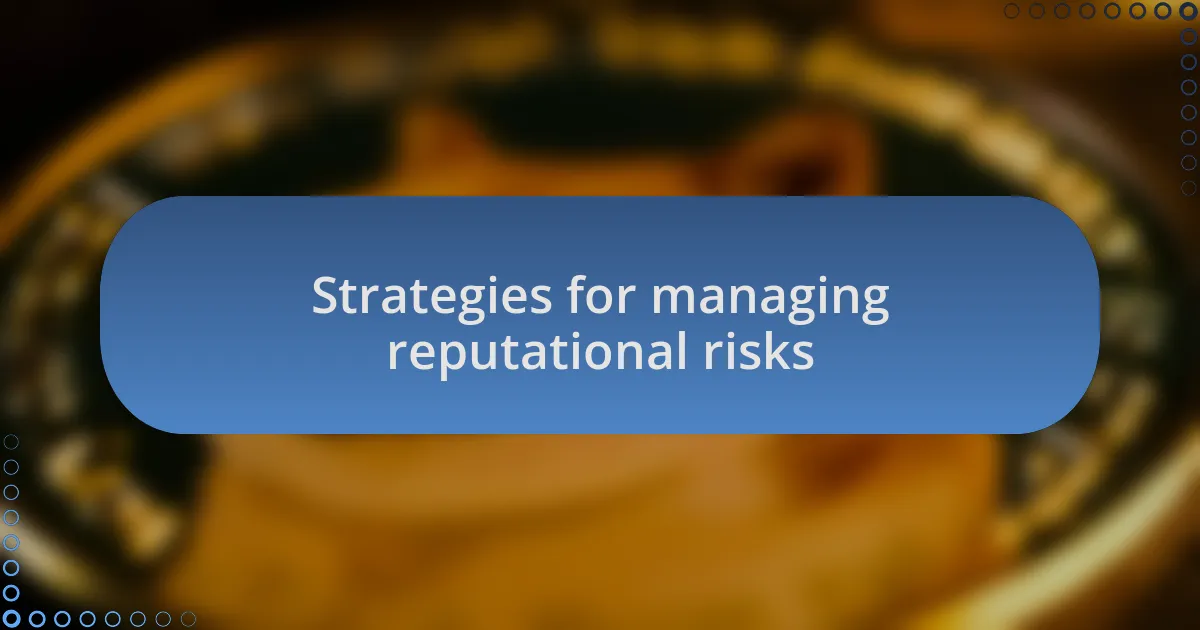
Strategies for managing reputational risks
When it comes to managing reputational risks, I’ve found that proactive communication is key. A few months ago, I observed a crypto project navigating turbulent waters due to a regulatory issue. Instead of going silent, they took to social media to address concerns directly and transparently, which fostered trust among their community. It made me wonder—how often do companies overlook the impact of timely updates?
Another effective strategy is to develop a crisis response plan ahead of time. I recall a scenario where a popular exchange faced a security breach. Thankfully, they had a well-prepared contingency plan that included clear messaging to their users. It’s interesting to note how much easier it was for them to maintain credibility amid chaos. Have you ever considered drafting a response strategy for your ventures? It’s a challenging yet necessary endeavor.
Finally, I’ve noticed that engaging with your audience can provide invaluable insights. I once participated in a feedback session for a platform that had faced backlash over a controversial decision. Listening to users allowed their team to rectify misunderstandings and show that they valued their community’s opinions. This experience left me questioning—how often do we let noise distract us from genuine connection? Truthfully, fostering open dialogues can be a game-changer in preserving a positive reputation.
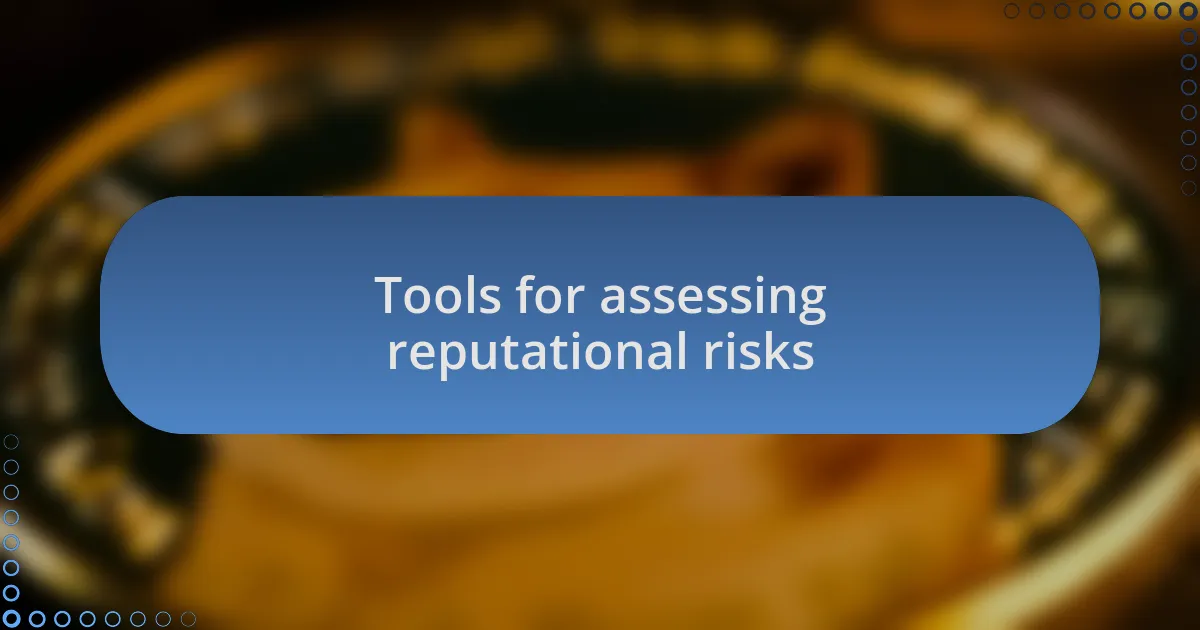
Tools for assessing reputational risks
Reputational risk assessment largely hinges on the right tools, and I’ve found social media monitoring platforms to be particularly effective. Just last year, I used one to track sentiment around a blockchain project I was analyzing. The immediate feedback from users helped me grasp not just the surface-level opinions, but also deeper emotional currents that could impact reputation. How often do we underestimate the power of public sentiment?
Another tool that has caught my attention is stakeholder surveys. I once conducted an informal survey for a startup that was struggling with its image after a rough launch. The data revealed specific areas for improvement that were being overlooked. This experience taught me that direct feedback from stakeholders can be a treasure trove of insights. Have you ever thought about how the voices of those impacted can shape your approach to risk management?
Additionally, sentiment analysis tools can give you a quantitative edge in assessing reputational risks. During a project, I explored a service that analyzed user comments across various platforms. The findings were eye-opening and helped the team prioritize their messaging. Isn’t it fascinating how numbers can often unveil truths we might otherwise miss? Using these analytical tools has truly transformed my understanding of reputational risks and how to navigate them effectively.